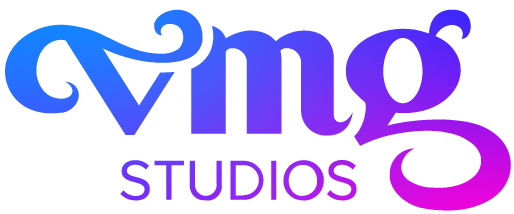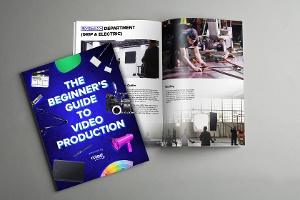Sourcing a project to someone outside of your organization can be downright scary. As a Type-A perfectionist myself, I sometimes have a hard time passing something off to someone else. What if they do it wrong? Will they complete it on time? Do they understand our brand and voice?
However, if you find the right fit for your project, trusting someone else to take the reins should be easy (in theory). Just because someone else is involved doesn’t mean you’re not.
As a hybrid creative marketing agency and video production studio, our team here at VMG Studios understands how overwhelming it can be to find the right partner. It can also be difficult to identify a mutually-beneficial workflow with the agency you hire. This is why we decided to outline the common practices of working with an agency to help empower our clients regarding their role in the process.
This article will break down how to work with a marketing agency, the benefits of working with one, and how best to define your involvement as a client.
What Does an Agency Do? (Marketing, Advertising, Video Production)
Whether you’re talking about a marketing, advertising, or video production agency, a good way to think of them is as an extension of your department: a partner or a project manager. They oversee, strategize, develop, implement, and often ideate your project from start to finish.
Let's say your company wants to produce a how-to video for a new product launch. An agency would come up with the creative and the strategy, write the script, hire actors, schedule the shoot date, staff the production (camera operators, directors, producers, etc.) and then finalize the video in post-production with editing, music, color-grading, audio sweetening, and motion graphics.
WATCH: How Much Time Does it Take to Make a Video? (Marketing, Corporate)
Benefits of Hiring an Agency
You might be wondering if it is worth the money to hire an outside agency to help. We know that many businesses are trying to source their creative content deliverables with an in-house team.
Well, you’ve likely heard the phrase “time is money” and that is something an agency can help save your business: time. Since an agency is essentially a project manager, they handle most tasks including the often-time-consuming busy work.
Agencies also bring their expertise to the table. Design, animation, and motion graphics are learned skills. Understanding how a narrative should be structured to hold the audiences’ attention and drive results doesn’t just happen overnight. Being able to effectively market a video to your target audience is easier said than done. Increasing your return on investment is no easy task.
Agencies are masters in these fields and can help you get the job done right the first time. Bringing it all full circle, that in turn, saves your business time.
Here's a high-level look at the 5 main benefits of hiring an agency:
- Expertise and experience
- Save time
- Save money
- Storytelling skills
- Trend-setters
FREE DOWNLOAD: Top Creative Trends of 2021 eBook
What’s My Role as a Client?
Now that you know the role an agency plays, you’re probably wondering, “how will I, the client, be involved?” You may also ask “how much can I or should I be involved?” The simple answer is that it’s up to you. But it’s important to define your involvement in the project from the beginning. Be sure to set clear expectations.
You might have a great idea for a marketing video and want to be involved in writing the script and developing the creative concept, then hand everything over for production and post-production. You might have no idea what creative direction to take or have no time to dedicate to the project and want the agency to take full control. Regardless of which route you take, defining your involvement from the beginning is crucial to a cohesive and productive relationship between you and the agency.
Client Communication with an Agency
Once you’ve defined your involvement in the project, you’ll next want to establish a line of communication. That includes the basics such as the method of communication: phone, text, email, or a project management program like Basecamp, and who you’ll be communicating with throughout the project.
Having a single point of contact is generally the easiest and cleanest way to pass along notes, questions, or concerns. This also prevents asking or answering duplicate questions, which can cause confusion or disorganization. Here at VMG Studios, we assign a producer to each project who serves as that single point of contact. They communicate with the client when it comes to project progress, deadlines, revisions, and notes and then pass along any necessary information to the creatives involved in the project (animators, director of photography, graphic designers).
Sure, there are times when it doesn’t make sense to have a single point of contact. If that’s the case, define the expertise for each contact and what they’ll be handling. For example, maybe you have a producer who handles communications regarding production progress, a Creative Director who provides visual assets or is working with you to write the script, and an account manager who keeps you up to date on financing and budgeting. Making sure each contact has a specific purpose keeps from muddying the waters of communication.
Client Responsiveness
Defining the method of communication and who you’ll be communicating with are important but there’s one integral puzzle piece that’s missing: responsiveness. Responsiveness is key and cannot be oversold. Even if an agency is managing your project, it’s still yours, meaning your feedback and approval are essential. Your responsiveness helps move the project along its projected timeline.
If the agency turns in a script, but you don’t review and send edits back for a week, your timeline will likely be pushed back. Keep in mind, the agency you’re working with probably has several other projects on their plate, so keeping to an agreed-upon timeline is crucial. The agency should know your key messaging point, your objective, and your audience, however it’s up to you, including your stakeholders and legal or branding teams, to give the final approval.
In the same sense, if your team is extremely responsive, you may be able to bump up your timeline and get your project done even sooner than anticipated (and who doesn’t like getting things crossed off your never-ending to-do list with time to spare!).
Once that line of communication with an agency has been opened: use it. Also, don’t be afraid to over-communicate. It’s better for an agency to fully understand your concept and goals than make a guess and have to correct it later on (adding more time onto your project).
Get to Know the People Working on Your Project
While they might not be sitting in the office next to yours, it’s important to build a personal connection with the people in the agency you’re working with. Communicate your best working environment and ask for their preferences too. Maybe you’ll find you’re both early risers and decide to set weekly meetings at 7:30 a.m. since it’s the only time you’re both available.
A little research never hurts either. Check out the agency’s website and social media channels. Check out your point of contact’s personal LinkedIn page. Here at VMG Studios, we have “Meet the Team” videos for every employee which offers a fun look at the personality of everyone on staff. Humanizing yourself and the people you’re working with can make a big difference in the nature of your project.
FREE WORKSHEET: 10 Questions to Ask a Production Company Before Hiring Them
Moving Forward with an Agency
When it comes to working with an agency, it’s important to treat it as a relationship: one that needs guidance, nurturing, and reassurance on your shared goals. As far as your involvement in the process, define it at the beginning. Setting expectations early on helps set realistic goals, while building trust and a cohesive workflow. When deciding to work with an agency, remember to consider these items:
- Define your involvement from the get-go.
- Define the communication channel with the agency.
- How will we communicate? Phone? Email?
- Who will I be communicating with? A single point of contact? Or several role-defined contacts?
- Respond, respond, respond.
- Get to know the people you’re working with.
Working with an agency doesn’t need to be a mystery. If you find an agency that doesn’t or won’t define these parameters with you, then they might not be the right fit for your project.
Learn more about video by clicking the image below to download the free eBook: The Beginner's Guide to Video Production.






